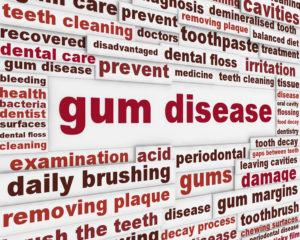How to Reverse Gum Disease
 Gum disease is one of the most common conditions we see here at our practice. In fact, most individuals will be affected by gum disease at some point in their lives, regardless of how well they take care of their teeth and gums. Gingivitis, which is the early stage of gum disease, is often reversible; however, more advanced stages of gum disease, also referred to as periodontitis, cannot be reversed. Even so, that doesn’t mean that severe stages of gum disease cannot be treated. In fact, there are periodontal care options available that can significantly slow the progression of gum disease and make the gums much healthier.
Gum disease is one of the most common conditions we see here at our practice. In fact, most individuals will be affected by gum disease at some point in their lives, regardless of how well they take care of their teeth and gums. Gingivitis, which is the early stage of gum disease, is often reversible; however, more advanced stages of gum disease, also referred to as periodontitis, cannot be reversed. Even so, that doesn’t mean that severe stages of gum disease cannot be treated. In fact, there are periodontal care options available that can significantly slow the progression of gum disease and make the gums much healthier.
For patients who are diagnosed with gingivitis, a professional dental cleaning along with strict adherence to oral hygiene routines (daily brushing and flossing), as well as visiting the dentist for the recommended number of check-ups, can go a long way toward preventing gum disease from getting worse. These simple steps can help reduce the potential for plaque buildup, which can lead to further bacterial invasion of the gums. Drinking plenty of water, eating nutrient-rich foods, and avoiding smoking can also be very helpful.
In cases of more advanced or aggressive gum disease, a “deep cleaning” will likely be necessary. A deep cleaning is actually what’s known in the dental field as a scaling and root planing procedure. The treatment involves the precise removal of calculus (hardened dental plaque/tartar) below the gumline and between the teeth, which can clean bacteria out of periodontal pockets. Planing the roots essentially makes them smoother, which helps the gum tissue attach to them. In some cases, an antibacterial/antimicrobial solution can also be placed on the gums to help reduce the development of more harmful bacteria.
Untreated gum disease can lead to extensive gum recession, tooth loss, and even serious risks to your general health, so it’s important to visit the dentist regularly and take good care of your teeth and gums. While gum disease is common—even more severe forms of it—you should know that there are many treatments available that can address it and help you keep it from getting worse.
For more information, or to schedule an appointment, we encourage you to contact our office today.
Previous Post Next Post